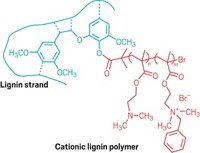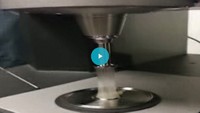Advertisement
Grab your lab coat. Let's get started
Welcome!
Welcome!
Create an account below to get 6 C&EN articles per month, receive newsletters and more - all free.
It seems this is your first time logging in online. Please enter the following information to continue.
As an ACS member you automatically get access to this site. All we need is few more details to create your reading experience.
Not you? Sign in with a different account.
Not you? Sign in with a different account.
ERROR 1
ERROR 1
ERROR 2
ERROR 2
ERROR 2
ERROR 2
ERROR 2
Password and Confirm password must match.
If you have an ACS member number, please enter it here so we can link this account to your membership. (optional)
ERROR 2
ACS values your privacy. By submitting your information, you are gaining access to C&EN and subscribing to our weekly newsletter. We use the information you provide to make your reading experience better, and we will never sell your data to third party members.
Nanomaterials
Biodegradable emulsion eliminates biofilms
Nanocomposite carrying an essential oil compound combats bacterial infections on cells and keeps bacteria from developing resistance
by Tien Nguyen
May 21, 2018
| A version of this story appeared in
Volume 96, Issue 21

Among multidrug-resistant bacteria, the toughest ones to beat make biofilms. These films shield bacteria and stick to surface wounds like burn injuries or bed sores. As modern medicines fail against resistant bacteria, some scientists propose turning to ancient yet proven remedies: essential oils. The challenge, however, is getting the greasy oils into water-based bacterial environments. Researchers led by Vincent M. Rotello at the University of Massachusetts, Amherst, engineered cross-linked poly(oxanorborneneimide) nanocomposites (X-BNCs) loaded with the compound carvacrol, which can be extracted from the essential oil of oregano. These nanocomposites smuggle the oil into biofilms grown on the surface of mouse cells (J. Am. Chem. Soc. 2018, DOI: 10.1021/jacs.8b03575). Within hours, the oil-soaked nanocomposites killed four pathogenic Gram-negative and Gram-positive strains of bacteria commonly found in hospitals, including two multidrug-resistant strains. The team also tested the bacteria’s ability to develop resistance to the nanocomposites. The researchers treated the bacteria with the nanocomposites until only a fraction survived, then regrew the bacterial culture in an iterative fashion and found that the bacteria was susceptible to the treatment even after 20 cycles. After the nanocomposite has ferried the antimicrobial agent behind bacterial enemy lines, the composite is degraded by biomolecules such as glutathione and esterase enzymes. The resulting fragments should then be safely expelled by the body, Rotello says.
CORRECTION:
This article was corrected on June 11, 2018, to clarify that carvacrol is itself not an essential oil but rather a compound in the essential oil of oregano.





Join the conversation
Contact the reporter
Submit a Letter to the Editor for publication
Engage with us on Twitter